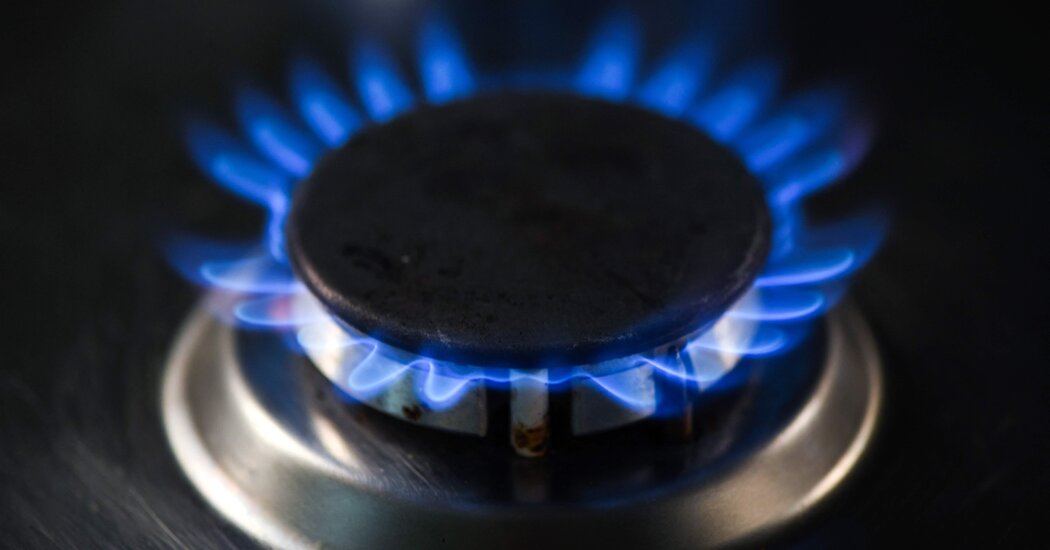Gasoline stoves leak vital quantities of methane when they’re being ignited and even whereas they’re turned off, in accordance with a brand new report, including to the rising debate over the consequences of gas-powered home equipment on human well being and local weather change.
The small examine — primarily based on measurements from cooktops, ovens and broilers in 53 houses in California — estimated that stoves emit between 0.8 and 1.3 % of the pure fuel they eat as unburned methane, a potent greenhouse fuel. Through the course of a typical 12 months, three-quarters of those emissions happen when the gadgets are shut off, the examine confirmed, which might recommend leaky fittings and connections with fuel service traces.
Over a 20-year interval, emissions from stoves throughout the US might be having the identical impact in heating the planet as half one million gas-powered automobiles, the examine estimated.
“Persons are so connected to their stoves,” stated Eric D. Lebel, a senior scientist on the nonprofit analysis institute PSE Wholesome Power and lead writer of the examine, which was revealed on Thursday within the journal Environmental Science & Expertise. “There’s one thing human about cooking on a fuel range, over an open flame.”
However increasingly proof, he stated, means that stoves are “damaging well being and local weather unexpectedly.”
Rising numbers of American cities, largely in blue states like California and Massachusetts, are shifting houses away from gas-powered cooking and heating. New York Metropolis final month banned fuel hookups in all new buildings. However at the least 20 largely pink states have barred cities from proscribing fuel use, usually with the assist of pure fuel corporations and utilities that see electrification as a risk to their backside traces.
There have been greater than 40 million fuel stoves in American households in 2015, the final 12 months for which there’s detailed knowledge from authorities surveys. In all, houses and buildings are answerable for an estimated 13 percent of America’s greenhouse fuel emissions.
Methane is the primary element of pure fuel, and if it isn’t burned when launched, it might heat the Earth greater than 80 instances as a lot as the identical quantity of carbon dioxide over a 20-year interval. Methane additionally contributes to ground-level ozone air pollution, which may trigger respiration issues and different well being points.
Methane leaks from oil and fuel installations have attracted rising consideration in recent times, and efforts are underway to plug 1000’s of inactive, methane-spewing oil and fuel wells throughout the nation. However much less analysis has been accomplished on emissions inside residences, stated Rob Jackson, an earth scientist at Stanford College who labored on the brand new examine.
Dr. Lebel, Dr. Jackson and two co-authors used plastic sheets to seal off kitchens in non-public houses, Airbnb leases and properties on the market or lease. They discovered that on common, igniting a burner on a fuel range emitted about the identical quantity of methane as did leaving it on and burning for 10 minutes. Gasoline ovens emitted methane at a better fee than cooktop burners, they discovered, as a result of ovens periodically ignite and extinguish their primary burner to keep up the set temperature.
The researchers additionally measured emissions over five-to-10-minute durations when stoves have been off, although they didn’t attempt to pinpoint the sources of the leaks.
Perceive the Newest Information on Local weather Change
“It’s nearly an inevitable byproduct of the pure fuel provide chain,” Dr. Jackson stated. “Each coupling, each becoming, has the potential to leak, particularly over time because the stoves sit there for years.”
Not one of the fuel leaks the researchers measured have been of a focus that may result in explosions, Dr. Lebel stated.
The researchers discovered that when it got here to methane emissions, older stoves didn’t carry out in another way from newer ones. Nor did pricier fashions outperform cheaper ones.
They acknowledged, nonetheless, that they wish to have carried out checks in additional houses owned by individuals who couldn’t afford to exchange or preserve previous home equipment. This could assist their outcomes higher seize the disproportionate impacts of fuel emissions on low-income households, they stated.
Ranges of methane within the environment have been skyrocketing in recent times, and scientists don’t absolutely perceive why, stated Kathryn McKain, a researcher with the Nationwide Oceanic and Atmospheric Administration Earth System Analysis Laboratory who didn’t work on the brand new examine.
Extra methane appears to finish up within the air than is accounted for by fuel consumption on the bottom. House home equipment, Dr. McKain stated, are “only one piece of the puzzle.”

